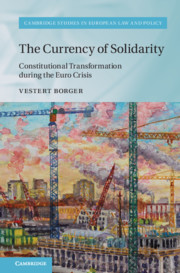Book contents
- The Currency of Solidarity
- Cambridge Studies in European Law and Policy
- The Currency of Solidarity
- Copyright page
- Dedication
- Contents
- Series Editors’ Preface
- Preface
- Acknowledgements
- Previously Published Work
- Table of Cases
- Prologue
- Part I Solidarity between the Member States
- Part II The Original Stability Conception
- Part III The New Stability Conception
- 5 The Shift in Solidarity
- 6 Contractual Change and Central Bank Action
- 7 Reconciling the Contract with the Treaties
- Conclusion
- Bibliography
- Index
5 - The Shift in Solidarity
from Part III - The New Stability Conception
Published online by Cambridge University Press: 24 September 2020
- The Currency of Solidarity
- Cambridge Studies in European Law and Policy
- The Currency of Solidarity
- Copyright page
- Dedication
- Contents
- Series Editors’ Preface
- Preface
- Acknowledgements
- Previously Published Work
- Table of Cases
- Prologue
- Part I Solidarity between the Member States
- Part II The Original Stability Conception
- Part III The New Stability Conception
- 5 The Shift in Solidarity
- 6 Contractual Change and Central Bank Action
- 7 Reconciling the Contract with the Treaties
- Conclusion
- Bibliography
- Index
Summary
This chapter discusses the initiation of the euro’s transformation and the shift from negative to positive solidarity, in the form of financial assistance, that it caused. Its origin lies in a historical meeting of the heads of state or government on 11 February 2010. There, the leaders initiated a change in the Founding Contract by jointly committing themselves to safeguard the currency union’s financial stability. The chapter subsequently focuses on the positive solidarity displayed towards distressed member states through various temporary rescue funds. This not only created difficulties for political leaders back home, politically and legally, it also put great strain on the single currency’s legal set-up that still reflected a stability conception from the past. The third part of the chapter therefore discusses how member states tried to take away this strain by incorporating the shift in solidarity in Union law through the creation of Article 136(3) TFEU, allowing member states in the currency union to establish a permanent rescue mechanism. The chapter traces the process and considerations behind both this amendment and the establishment of the mechanism it enabled.
Keywords
- Type
- Chapter
- Information
- The Currency of SolidarityConstitutional Transformation during the Euro Crisis, pp. 205 - 260Publisher: Cambridge University PressPrint publication year: 2020

